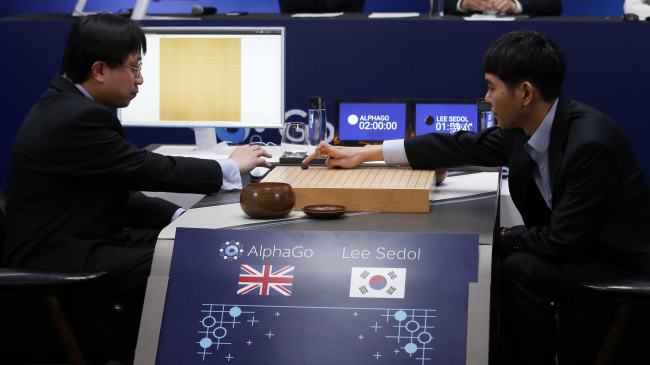Ahead of a historic showdown between Go grandmaster Lee Se-dol and Google’s artificial intelligence program AlphaGo, tension filled the air of the venue, the Four Seasons Hotel in Seoul, on Wednesday.
Mirroring the worldwide attention, some 300 journalists from around the world gathered at the battleground to witness what would become a new chapter in history of both Go and AI regardless of the outcome.
Lee chose black stones to start the game first. It was an unexpected choice considering that a player with white stones receives 7.5 points for playing later under Chinese Go rules.
Lee took 19 seconds to make the first move on the three-four point (the intersection of the third line from right and fourth line from top).
AlphaGo seemed more cautious. It spent one minute and 30 seconds to place the first stone on the four-four point. Its white stones were placed by DeepMind developer Aju Huwang, a sixth dan player in Go.
“Starting to focus on the battle on the top part of the board is a popular opening,” said Michael Redmond, the only western ninth dan player and commentator of the Wednesday match.
-
Match 1: March 9 (Wed.) 1 p.m. (KST)
-
Match 2: March 10 (Thurs.) 1 p.m. (KST)
-
Match 3: March 12 (Sat.) 1 p.m. (KST)
-
Match 4: March 13 (Sun.) 1 p.m. (KST)
-
Match 5 (final): March 15 (Tues.) 1 p.m. (KST)
Lee, who holds 18 international titles, earlier said that he had weak opening strategies, according to the commentator, but his opening at the match was seemingly aggressive enough to make it hard for the computer to respond.
Lee also came up with irregular moves on and off in the early phase of the game, which a commentator said were “outside of the database.”
The two opponents were pitted against each other on the top right area in the early stage of the game. The AI challenger first focused on taking up the left territory of the board while the human champion attempted to increase his presence on the right side of the 19-by-19 Go board.
Things became complicated after 40 minutes into the game as the black and white sides became aggressive in ramping up their attacks.
AlphaGo, which was previously thought to play conservative, was not afraid of stepping up the fight against the human player who is considered much stronger than Fan Hui, the three-time European Champion the computer beat six months ago.
The tug of war continued with neither player holding a commanding lead even after one hour and 20 minutes into the game and Lee left his seat to take rest for five minutes.
“I don’t like the move that AlphGo just made,” said the U.S. commentator, mentioning about a rather clumsy move by the computer at one point.
Speaking at a press meeting before the man-versus-computer Go match, Jeffrey Dean, a Google senior fellow, drew a rosy picture of technologies behind AlphaGo, such as deep learning and machine learning, dispelling some worries raised by some pessimists on AI.
“They could be both beneficial, and sinister like military applications. It is up to society to figure out how we are going to use technology,” the head of the Internet giant’s deep learning research team Google Brain said.
“Machine learning for health care will be powerful and will improve the lives of many.”
Ke Jie, a rising Chinese Go star who is considered the nemesis of Lee Se-dol, is said to have been willing to have a match with AlphGo before.
“Why not me? I beat Lee Se-dol,” an official from the American Go Association, a U.S. organization to promote the ancient Asian game, cited Ke Jie as saying.
The 18-year-old Chinese Go master recently won an international Go championship after beating the Korean star.
He is slated to face off with an artificial intelligence software developed by a Chinese AI firm in the coming days.
“Many people in the U.S. have been intrigued by the match between Korean master Lee and AlphaGo,” said the official, adding the match between the Chinese top player and the AI could further boost the popularity of the board game in the U.S. where the professional Go system was founded in 2012.
Echoing the AGA official, Andrew Okun, the AGA president, said that different from now “human players will try to challenge the computer grandmaster in the near future.”
By Kim Young-won (
wone0102@heraldcorp.com)








